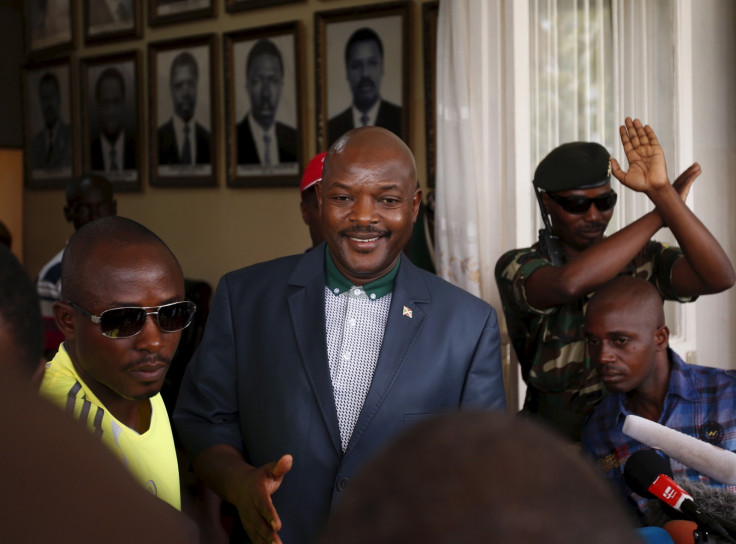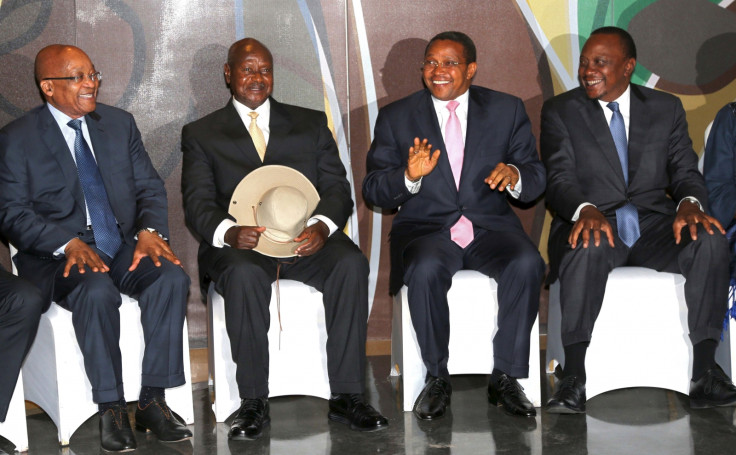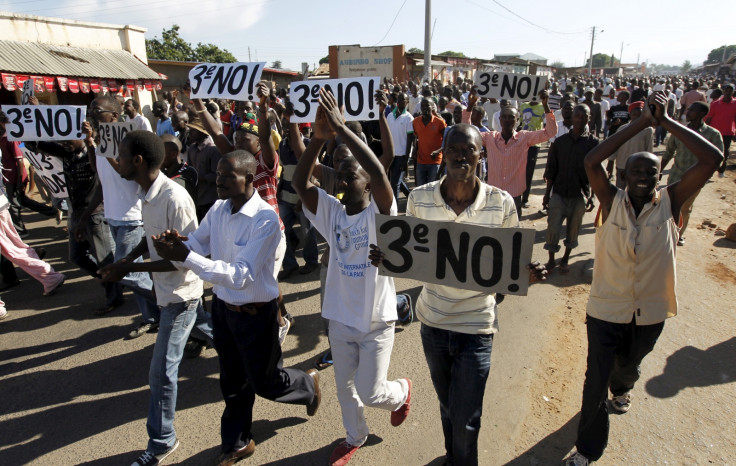Burundi: President Nkurunziza stands firm on third-term issue with EAC leaders

Burundi President Pierre Nkurunziza stood firm on his decision to run for a third-term in office when he met with leaders of the East African Community (EAC) in Burundi on Monday 15 June.
"The fact that the EAC leaders refused to take a position means that they know that for Nkurunziza, it's a question of life or death and he will stand for office again, whether there is a blood bath or not," opposition leader Leonce Ngendakumana, told IBTimes UK.
The meeting was part of a regional effort to put en end to months of violence in the small country.
It is estimated that between 60 and 70 people have died and around 150,000 civilians have sought refuge in neighbouring countries since the start of the violence on 26 April, when Burundi's ruling National Council for the Defense of Democracy (CNDD-FDD) party nominated Nkurunziza to stand for re-election.
Opposition leaders want the president to withdraw his third-term bid, claiming it violates the country's constitution and the Arusha Accords, a peace deal that ended ethnic civil war and established the foundation for Burundi's post-conflict recovery in 2005.
But Nkurunziza's supporters argue the president's first term should be discounted as he was chosen by the parliament and not by the people in an election as is specified in the agreement.
'Nkurunziza won't compromise'
On Monday (15 June) afternoon, eight leaders of the EAC met with the president, a group of opposition chiefs and representatives of the civil society.
The EAC delegation first met with Nkurunziza and members of the CNDD-FDD before hearing 30-strong Burundian delegation, which included the heads of the ADC, the FNL-Uprona coalition and Frodebu.

Ngendakumana, the head of the Democratic Alliance for Change (ADC Ikibiri), who was part of the delegation at the Roca Hotel in the capital Bujumbura, explained the EAC leaders told the opposition Nkurunziza was refusing to change his position on his third term.
"We met the leaders after the delegation met with the president. They explained to us the difficulties they had with Nkurunziza over the third-term question and how difficult it had been for them to take a firm position that would not compromise peace in the country," Ngendakumana said over the phone on Tuesday (16 June) morning.
After agreeing to discuss the issue surrounding his third-term mandate on 4 June – for the first time since the country was engulfed in political violence – the government said on 9 June that the third-term bid was "non-negotiable".
Opening a Burundian dialogue
The delegation said it was hoping to engage a political dialogue between Burundians, the United Nations, the African Union, the European Union and the EAC, especially regarding the issue over the third mandate.
"The EAC told us it was favouring a dialogue between Burundians to find a compromise. That's their strategy," Ngendakumana said of the three-hour long meeting.
For the politician, if none of the questions regarding the third-term, the disarmament of the country's militias, a new electoral calendar and the immediate deployment of human rights observers are resolved, there will be no election in Burundi.
The armed groups include the members of the CNDD-FDD's Imbonerakure youth wing.

"That's because it is only a number of Imbonerakure aided by some police officers who prepare the elections with arms, not the CENI. This is terrorism: there is no electoral campaign except a few field visits from the CNDD-FDD with two satellite parties," Ngendakumana claimed.
"So this is what we told the EAC leaders, that we just wanted both the Constitution and the Arusha Accords to be respected, would it be in one week or two months – we just want to go forward with these elections."
According to Ngendakumana, the opposition also stated it could agree to go past the constitutional deadlines and would be ready to make a concession.
"We want elections that will help us restore peace, trust and hope in the country," he added.
During a crisis summit in Dar Es Salaam, Tanzania on 31 May, about the ongoing violence in Burundi, EAC leaders set out a list of recommendations and called for a delay of the contested elections.
This was followed on Sunday (14 June) by proposals from the AU, which were cautiously welcomed by the opposition, claiming they somewhat failed to address the issue of the third mandate.
© Copyright IBTimes 2024. All rights reserved.






